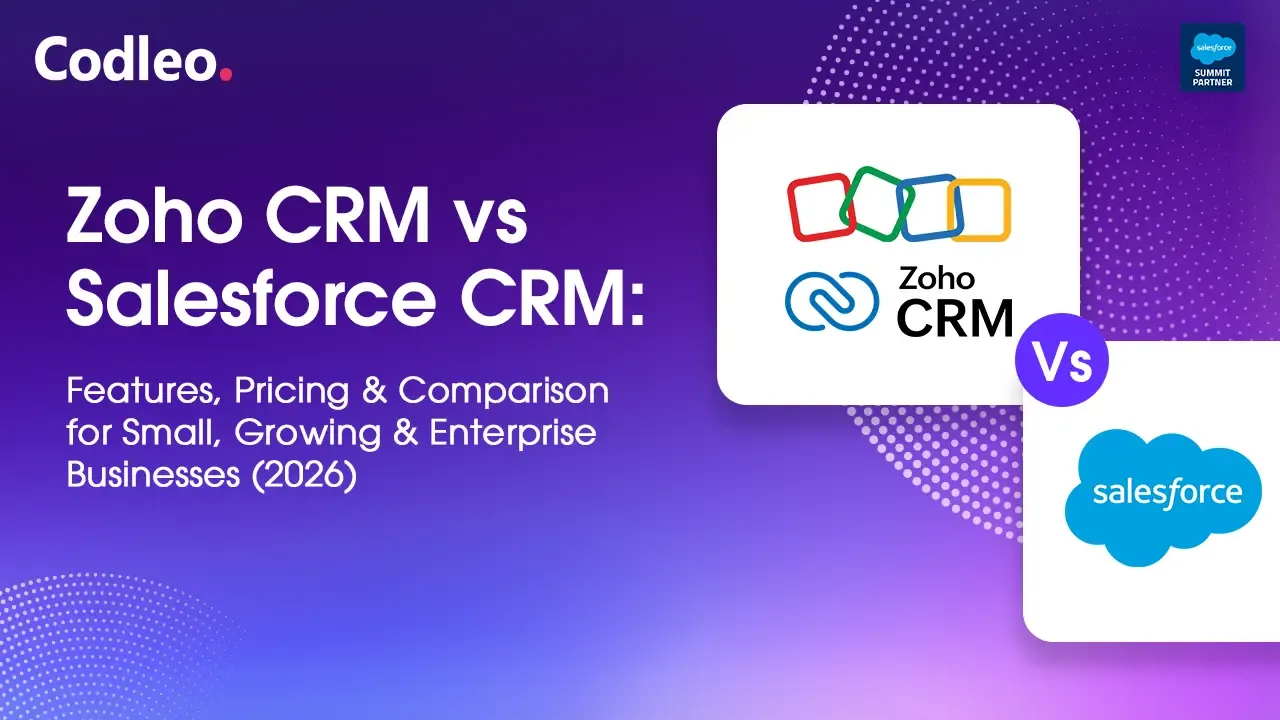Publish date:
Maintaining and enhancing customer relationships is the cornerstone of success in today's competitive business environment. As businesses expand and customer interactions increase, implementing a customer relationship management (CRM) system becomes indispensable. Here’s why CRM is your business's next best investment in 2026.
To succeed, a business must build strong relationships with current customers and seek out new ones. It means engaging with customers through various channels and platforms. As businesses interact more with customers, it is essential to manage these interactions effectively.
Understanding customer Relationship Management (CRM) is essential. CRM strategies help companies make customers happier, boost sales, and improve efficiency, which is necessary for growth and staying competitive.
Acknowledging the importance of CRM is essential. Implementing CRM strategies allows companies to improve customer happiness, increase sales, and optimize operational efficiency, which are all key to fostering growth and retaining a competitive advantage.
What is a CRM, and why is it useful?
CRM software is essential for managing relationships with customers and prospects. It helps businesses connect with their customers and build better relationships. CRM systems also make processes more efficient, which can lead to higher profits.
Every interaction with a customer matters. Customer Relationship Management (CRM) systems help businesses understand how customers behave and what they need. These systems allow companies to change their strategies as needed. With CRM software, your business can recognize the unique value of each customer. The better you understand your customers, the better you can serve them, which will help increase sales.
7 Benefits of Customer Relationship Management
1. Customer Service and Retention
-
The main benefit of using a CRM is that it improves customer relationships. A CRM system gathers all customer information in one place, including demographics, buying history, and previous interactions across different channels.
-
A CRM system makes accessing important customer information easy for your team. Every interaction with a customer is a chance to boost their satisfaction, and a CRM helps your team do this smoothly.
-
Good customer service is essential for keeping customers loyal. When customers leave frequently, it can hurt your sales and brand image. A CRM system can help improve your customer service and strengthen loyalty. CRM systems automate support tasks, track customer actions, and analyze customers' feelings. These tools allow you to spot and fix problems before they get worse. Using a CRM to improve customer service can help you keep your customers.
2. Increased Sales
When customers come back, your sales naturally go up. Customer Relationship Management (CRM) systems make your sales process more manageable by automating important tasks. They help you keep all your sales data in one central place that everyone who needs it can access. This makes it easier for your business to create a transparent sales process that your team can adjust.
3. Analytics
Analytics are essential for understanding customer behavior. Many customer data is available, but the real challenge is using this data to improve business operations. CRM systems have built-in analytics that help make sense of customer data. Metrics such as click-through rates, bounce rates, and demographic information show how a campaign is performing and highlight areas that need improvement.
4. Higher Productivity
CRM software with marketing automation tools can simplify your employees' jobs by automating routine tasks. It helps staff focus on essential activities, like building customer relationships, and ensures that tasks are done on time. Many CRM systems have dashboards that show your business processes and workflows. These tools let you quickly find areas where you can improve your workflow.
5. Cultivating New Leads
-
CRM systems help you create marketing strategies that fit your customers' needs. They allow your business to communicate personally and develop new products and services that meet your customers' needs.
-
CRMs give you a complete view of the customer journey. You can see all communications with current and potential customers. With this information, you can more easily plan your next steps, essential for finding new leads and maintaining strong customer relationships.
6. Enhanced Marketing
CRM systems help you develop marketing strategies that match your customers' needs. They enable your business to communicate personally and create products and services that genuinely meet your customers' wants and needs.
7. Boosting Profit Margins
Implementing a CRM system allows you to gain valuable insights into which customers are more profitable and which are less so. This understanding helps you efficiently manage each customer segment. Streamlining costs and prioritizing your most profitable clients can significantly boost profitability.
How Can CRM Benefit My Business?
CRM systems significantly benefit the retail, financial services, insurance, banking, consulting, and agriculture industries. Businesses within these sectors have recognized that CRMs are invaluable, particularly for companies with dedicated sales and marketing teams. A CRM solution can also streamline invoicing processes if your business involves a billing department.
Numerous businesses across various industries struggle to keep up with their leads or grow so rapidly that their customer service quality diminishes. Some lack a systematic approach to tracking sales. Both new and established businesses can encounter these issues. A CRM system offers a remedy to these challenges and more. Adopting a CRM system could be highly beneficial if your company aims to enhance customer relationships, manage customer interactions more effectively, and boost sales.
Challenges of CRM
CRM systems offer clear benefits, but businesses must face several challenges for successful use and ongoing success:
-
User Adoption: Getting employees to use the CRM system regularly is challenging. To help with this, we need to provide proper training, clearly show the system's benefits, and make sure it is easy to use.
-
Data Integrity: A CRM's effectiveness depends heavily on its data quality. Ensuring data is accurate and up-to-date is vital, and this requires established routines for data entry, routine data cleaning, and effective integration with other business systems.
-
Cost and ROI: Investing in a CRM system can be substantial. Businesses should clearly understand all associated costs—like licensing, setup, and training—and establish realistic expectations for the system's return on investment.
-
System Integration: Often, a CRM must be integrated with other existing systems, such as email platforms and accounting software. This integration can be complex and require specialized technical expertise or IT support.
-
Change Management: When implementing a new CRM system, it is critical to manage the transition so that existing business processes are not disturbed. A comprehensive change management strategy can assist in smoothing this shift. This strategy should promote strong leadership and transparent communication.
Ways to Overcome CRM Implementation Challenges:
-
Choose the Right CRM: Assess your business requirements and budget to select a CRM that perfectly meets your needs.
-
Develop a Comprehensive Implementation Plan: Outline a thorough CRM implementation strategy and gather insights from team members across various departments.
-
Focus on Training: Offer detailed training for each role to help users feel confident using the new system.
-
Track and Assess Progress: Set clear measures to evaluate how well your CRM is working. This help will help you see your investment return and confirm commitment.
Selecting the Right CRM for Your Business
Many CRM solutions are available in the marketplace, each with unique features. First, list your specific needs and challenges to find the best CRM for your business. Understand the different stages and types of customer interactions. Talk to your team members, especially those in marketing and sales, to learn about the essential customer data and how they communicate with customers.
Having well-defined business objectives allows you to evaluate the various features different CRM systems offer. It's a good idea to “test drive” a CRM to gauge user-friendliness, intuitiveness, and alignment with your business needs.
Choosing a CRM solution should be a proactive step, not a reaction to challenges. Please don't wait until your business has outgrown its current processes. CRM systems improve customer service, help develop leads, increase sales, and provide your team with essential data.
WayPath provides customized CRM solutions that fit smoothly into your business plan, helping you grow and work more efficiently. Modern CRM systems are essential for any business that wants to reach its goals quickly. The best time to start using a CRM is now so your business stays aligned with its strategic objectives.
Considering Salesforce for Your CRM Needs
When you look for a CRM system, consider Salesforce. It is known for being flexible and having many features for different sizes and types of businesses. You can customize Salesforce to fit your specific processes and goals. By choosing Salesforce, you get strong analytics, a cloud-based system for easy access, and many integrations that improve its functionality. Testing Salesforce can show you how its features meet your business needs, making it a key part of your operations.
Ready to Elevate Your Business with CRM?
At Codleo Consulting, we create custom CRM solutions that work well with your business processes. Don't let your business outgrow your current systems. Contact us today to see how our CRM solutions can improve your operations and help your business grow.
Let our experts guide you through its robust features and customizations to see how it aligns with your business needs. Schedule a demo with Codleo Consulting today and take the first step towards a more organized, productive, and profitable business future.















